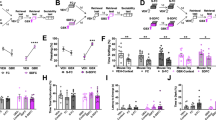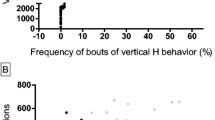Abstract
The effects of hashish extract on adaptive behavior of male mice were studied in a paradigm which allows the investigation of learning mechanisms in a social context. Mice of the C3H strain, which were not submissive in a confrontation with a nonaggressive DBA mouse on day 1, were defeated on day 2 over 3 min by aggressive, isolated DBA mice, and showed conditioned submissive behavior upon mere contact with a nonaggressive DBA mouse on day 3. A hashish extract containing 38.6–39.4% Δ 9-tetrahydrocannabinol (Δ 9-THC), 11.6–12.0% cannabinol and 47.7–48.5% cannabidiol was administered orally in all experiments. Hashish extract given 90 min before defeat on day 2, in dosages corresponding to 1, 5, and 10 mg Δ 9-THC/kg, impaired retention of defensive upright, defensive sideways and immobility on day 3 (experiment 1). Experiment 2 showed that the drug (5, and 10 mg Δ 9-THC/kg) had no antinociceptive potency in mice and did not modify defeat-induced analgesia. Experiment 3, with drug (5 mg Δ 9-THC/kg) or solvent administration on day 2 and day 3, showed that the retention deficit was neither due to state-dependent learning, nor to impaired retrieval. It is suggested that hashish extract administered before learning may interfere with memory processing.
Similar content being viewed by others
References
Barry H, Kubena RK (1971) Repeated high doses of Δ 9-tetrahydrocannabinol enhance acquisition of shock avoidance by rats. Am Psychol Assoc Proc 79:747–748
Bueno OFA, Carlini EA (1972) Dissociation of learning in marihuana tolerant rats. Psychopharmacologia 25:49–56
Chesher GB, Dahl CJ, Everingham M, Jackson DM, Marchant-Williams H, Starmer GA (1973) The effect of cannabinoids on intestinal motility and their antinociceptive effect in mice. Br J Pharmacol 49:588–594
Clark WC, Goetz RR, McCarthy RH, Bemproad B, Zeidenberg P (1979) Effects of marihuana on pain and verbal memory: A sensory decision theory analysis. In: Nahas GG, Paton WDM (eds) Marihuana: Biological effects. Adv Biosci: 22, 23, Pergamon, New York, pp 665–680
Cutler MG, Mackintosh JH, Chance MRA (1975) Effects of cannabis resin on social behavior in the laboratory mouse. Psychopharmacology 41:271–276
Darley LF, Tinklenberg JR, Roth WT, Hollister LE, Atkinson RC (1973) Influence of marihuana on storage and retrieval processes in memory. Memory and Cognition 1:196–200
Dornbush RL, Kokkevi A (1976) Acute effects of cannabis on cognitive, perceptual and motor performance in chronic hashish users. In: Dornbush RL, Freedman AM, Fink M (eds) Chronic cannabis use. Ann NY Acad Sci, vol 282. New York Academy of Sciences, New York, pp 313–322
Eddy NB, Leimbach D (1953) Synthetic analgesics II. Dithienylbutenyl-and dithienylbutylamines. J Pharmacol Exp Ther 107:385–393
Frischknecht HR, Siegfried B, Waser PG (1982) Learning of submissive behavior in mice: A new model. Behav Processes 7:235–245
Glick SD, Milloy S (1972) Tolerance, state-dependency and longterm behavioral effects of Δ 9-THC. In: Lewis MF (ed) Current research in marihuana. Academic Press, New York, pp 1–24
Goldberg ME, Hefner MA, Robichaud RC, Dubinsky B (1973) Effects of Δ 9-tetrahydrocannabinol (THC) and chlordiazepoxide (CDP) on state dependent learning: Evidence for asymmetrical dissociation. Psychopharmacologia 30:173–184
Grant EC, Mackintosh JH (1963) A comparison of the social postures of some laboratory rodents. Behaviour 21:246–257
Henriksson BG, Järbe TUC (1971) Effect of two tetrahydrocannabinols (Δ 9-THC and Δ 8-THC) on conditioned avoidance learning in rats and its transfer to normal state condition. Psychopharmacologia 22:23–45
Herring B (1972) The effect of 1-Δ 1-trans-tetrahydrocannabinol on learning and retention of avoidance performance in rats. Psychopharmacologia 26:401–406
Hill SY, Schwin R, Powell B, Goodwin DW, (1973) State-dependent effects of marihuana on human memory. Nature 243:241–242
Klonoff H, Low M, Marcus A (1973) Neuropsychological effects of marihuana. Can Med Assoc J 108:150–156
Loftus EF (1980) Alcohol, marihuana and memory. Psychology Today 13:42–56
McMillan DE (1977) Behavioral pharmacology of the tetrahydrocannabinols. In: Thompson T, Dews PB (eds) Advances in behavioral pharmacology, vol 1. Academic Press New York, pp 1–34
Miller LL (1984) Marijuana: Acute effects on human memory. In: Agurell S, Dewey RE, Willette RE (eds) The cannabinoids: Chemical, pharmacologic and therapeutic aspects. Academic Press, Orlando, pp 21–46
Miller LL, Cornett TL, Brightwell DR, McFarland DJ (1977) Marijuana: Effects on storage and retrieval of prose material. Psychopharmacology 51:311–316
Miller LL, Drew WG (1974) Cannabis: Review of behavioral effects in animals. Psychol Bull 81:401–417
Overton DA (1968) Dissociated learning in drug states (state dependent learning). In: Efron DM (ed) Psychopharmacology: A review of progress. US Government Printing Office, Washington, pp 918–930
Sieber B, Frischknecht HR, Waser PG (1980) Behavioral effects of hashish in mice: I. Social interactions and nest building behavior of males. Psychopharmacology 70:149–154
Sieber B, Frischknecht HR, Waser PG (1982) Behavioural effects of hashish in mice in comparison with other psychoactive drugs. Gen Pharmacol 13:315–320
Siegfried B, Frischknecht HR, Waser PG (1982) A new learning model for submissive behavior in mice: Effects of naloxone. Aggressive Behav 8:112–115
Siegfried B, Frischknecht HR, Waser PG (1984) Vasopressin impairs or enhances retention of learned submissive behavior in mice depending on the time of application. Behav Brain Res 11:259–269
Sofia RD, Vassar HB, Knobloch LC (1975) Comparative analgesic activity of various naturally occurring cannabinoids in mice and rats. Psychopharmacologia 40:285–295
Tinklenberg JR, Melges FT, Hollister LE, Gillespie HK (1970) Marijuana and immediate memory. Nature 226:1171–1172
Author information
Authors and Affiliations
Rights and permissions
About this article
Cite this article
Frischknecht, H.R., Siegfried, B., Schiller, M. et al. Hashish extract impairs retention of defeat-induced submissive behavior in mice. Psychopharmacology 86, 270–273 (1985). https://doi.org/10.1007/BF00432212
Received:
Accepted:
Issue Date:
DOI: https://doi.org/10.1007/BF00432212




